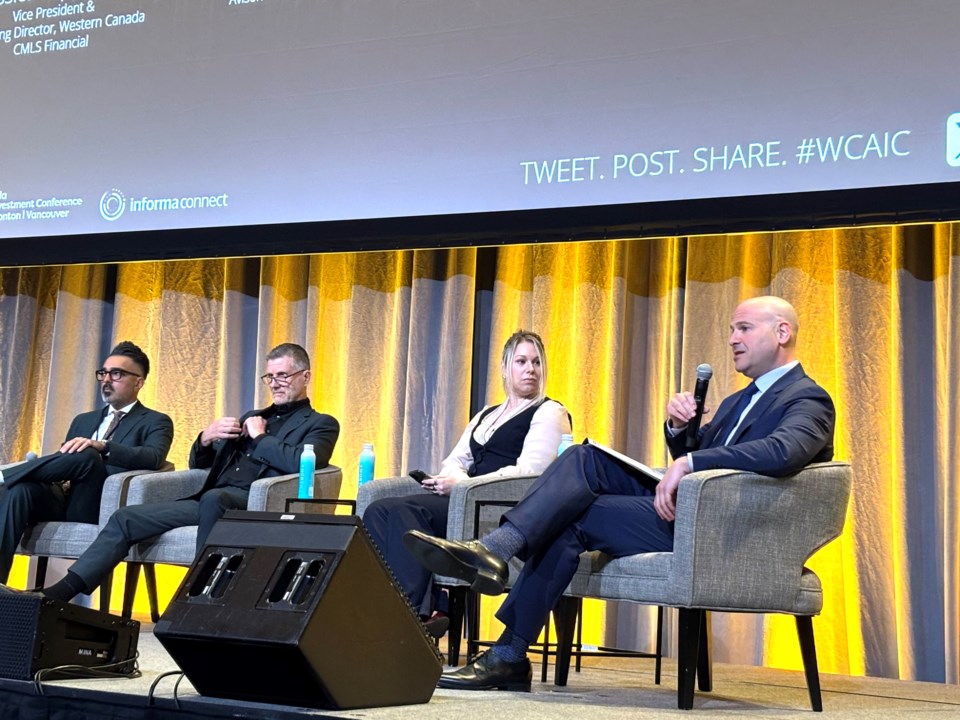Following a bumpy few years, some apartment investors see glimmers of hope in Metro Vancouver.
“Overall, the roller-coaster continues, but I would say that we’re in a much better place today than we were a year ago in terms of market sentiment,” Mark Goodman, principal of Goodman Commercial Inc., told the Western Canada Apartment Investment Conference in downtown Vancouver on Tuesday.
After a pronounced drop in activity in 2022 and 2023, transactions in the Vancouver apartment rebounded in 2024, with transactions up 33 per cent and dollar volume up 71 per cent to almost $1.8 billion, according to .
While international trade concerns are fuelling economic uncertainty, Goodman said other themes are proving to be much more impactful than tariffs, including transit-oriented density and provincial rental protection.
“Another major theme obviously this year is tariffs, tariffs, tariffs, on and off. I don’t think it’s having a material impact in the investment market. It’s just a lot of noise right now,” he said.
With a softening of rents in Vancouver, investors may find other Western markets more appealing. For example, Edmonton still has five to seven per cent of “runway” left in its rental market, said Jandip Deol, multi-family principal with Avison Young (Canada) Inc.
“I think that’s probably one of the few markets in the country where there’s still substantial rent growth left,” Deol said during a conference panel at the Vancouver Convention Centre.
He said tenants are still being secured despite a slow-down in immigration. This trend, Deol said, is trickling down to the land market: If a site comes up in Edmonton, “there’s typically multiple bidders, so developers want to be out there.”
In Calgary, meanwhile, the market has seen some boom-and-bust since 2000, said Harvey Russell, senior vice-president and principal with NAI Advent Commercial Real Estate Corp.
He said the city currently boasts strong fundamentals, population growth, affordability and no rent controls. But on the other hand, Russell said high-end downtown rents are softening, zoning challenges exist in different suburbs and pockets of oversupply are present, leading to a pause in some construction.
“Even though we’re in a bit of an adjustment, everybody’s still happy to be in Calgary,” he said.
More broadly, tenant preferences are shifting toward livability, walkability and amenities, said Meghan Henselwood, managing director of transactions with Manulife Investment Management, the asset management arm of Manulife Financial Corp.
“I was in one [smaller building] recently where I don’t think you could fit a double bed in the bedroom,” she said.
“I don’t think that that’s long-term. We’re kind of seeing it in the condo market … with renters not wanting to rent those units that are really small and not livable. Then you can’t retain your tenants and you’re getting higher vacancy.”
In Vancouver, Goodman said “there’s no big home run” and that apartment owners who bought after 2016 or 2017 could potentially have trouble breaking even if they sell now. He said as the gap between buyer offers and seller prices narrows, both sides are starting to agree more on pricing.
“Price reductions are the magic weapon right now to get buyers to the table,” he said.
“There’s a lot more product on the market right now, probably three or four times more development sites and apartment buildings than we’ve seen in years. So it’s just really jockeying for position and being more competitive with your pricing.”




